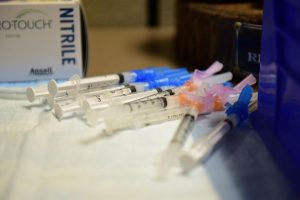I was breathless, flushed, and worn out – symptoms that were consistent with the deadly SARS-CoV-2 virus. Or perhaps signs of sheer exhaustion from my 24-hour shift in the Kenyan critical COVID ward while wearing the required heavy, tight, personal protective attire. I contemplated going in for my second PCR test for the week, while thoughts of fear clouded my mind. Will I infect my loved ones while I treat the loved ones of others? Will I fall terribly ill and need critical care? Will I die tomorrow? These questions replayed in my mind every day when I was at work. In the midst of all this, there was a glimmer of hope as news had spread that there were successful phase 3 clinical trials of the SARS-CoV-2 vaccine in many western countries and emergency use authorization ensuing. I was eagerly anticipating the first doses of vaccines for the healthcare workers in my country and the population at large. Then the waiting game began.
As the days went by, it became clear that the rollout of the vaccine in Kenya would be slow. Many low and middle-income countries were being left behind as wealthy countries and big pharma outbid them for the limited supply of vaccines (1). It seemed like the leaders of these countries were more focused on protecting their own populations first. This was a devastating realization for healthcare workers like myself, who were at the frontlines of the fight against the virus every day. I couldn’t help but feel a sense of injustice. It was a difficult time, yet I held onto hope that eventually, the vaccine would reach us and that we could protect ourselves and our communities. As I saw the healthcare workers in wealthier countries receiving the vaccine while I and many others still had to wait, I realized we possibly were a divided world after all.

The concept of vaccine apartheid is not new. In fact, it is a reflection of the broader systemic inequalities that exist in our world. The COVID-19 pandemic has only served to highlight these inequalities and the devastating consequences that they can have on the most vulnerable populations. While wealthier countries have been able to secure a steady supply of vaccines, low- and middle-income countries have been left to fend for themselves. Currently, only 23.4% of people in low-income countries have received at least one dose of the SARS-CoV-2 vaccine compared to 81% (2) in the USA. An open letter to G20 leaders in October 2021 highlighted how 133 doses per 100
people have been given in high-income countries (HIC) compared with four doses per 100 people in low-income countries (LIC) (3). Mike Ryan, executive director of the WHO emergency program equated the vaccine apartheid to handing out extra life jackets to some while leaving others to drown.
Early on in the COVID pandemic, the leaders of wealthy countries and big pharma pledged to respond with “global solidarity.” Soon after vaccines against SARS-CoV-2 were developed, many governments and leaders of HIC pushed low and middle-income countries to the back of the queue by outbidding poorer countries. Big pharma and covid-19 vaccine makers Moderna, Pfizer, and BioNTech have all refused requests from the World Health Organization to share technology that will transfer mRNA vaccine technology to low and middle-income countries. Without their cooperation, it will take years longer before we can immunize all persons in the Global South.
In July 2022, the pharmaceutical industry signed the Berlin Declaration, which was the result of two years of international pressure to waive intellectual property rights for Covid-19 vaccines and treatments (4). In spite of intellectual property waivers, technology transfer mechanisms remain lacking. BioNTech has made agreements to set up pre-built “BioNTainer” production sites for mRNA vaccines in Rwanda and Senegal (5). However, local partners will only be responsible for fill and finish functions, giving no ownership to the country (6). Amid public pressure for the TRIPS waiver request, Johnson & Johnson partnered with Aspen Pharmaceuticals and Pfizer & BioNTech partnered with Biovac for fill-and-finish agreements in South Africa (7). Pfizer argued against the waiver by saying that “Weakening IP rules will only discourage the type of unprecedented innovation which brought vaccines forward in record time and make it harder for companies to collaborate going forward” (8). None of the deals involve technology transfer and vaccine constituents will continue to be sourced from these high-income countries.
Once again, pledges of “equity” and “global solidarity” have been made, however with a lot of strings attached and centered around monopolies remaining within the vaccine-creating pharmaceuticals. Are big pharma profits worth more than human lives? On April 12, 1955, Edward R. Murrow asked Jonas Salk who owned the patent to the polio vaccine. “Well, the people, I would say,” Salk responded. “There is no patent. Could you patent the sun?” (9). Governments in positions of power need to do a lot more than just pledge donations of vaccines. We, the global community need to recognize that the health of one country is tied to the health of all countries and that we must work together to ensure equitable access to vaccines for everyone, regardless of their wealth or power.
The first group of healthcare workers in Kenya were finally vaccinated, in tandem with the young healthy adult population category in the United States. The vaccine inequity between high-income and low-income countries demonstrates a serious disregard for the lives of the world’s poorest countries.
Let us use our privilege, our voices, and our compassion to help create a more equitable and just world. Together, we can make a difference in the fight against this and the next pandemic.
Written by Shradha Doshi, pictured above
References
- Aizenman N. Why low income countries are so short on COVID vaccines. Hint: It’s not boosters. NPR [Internet]. 2021 Nov 10 [cited 2023 Mar 1]; Available from: https://www.npr.org/sections/goatsandsoda/2021/11/10/1052078529/why-low-income-countries-are-so-short-on-covid-vaccines-hint-its-not-boosters
- Mathieu E, Ritchie H, Rodés-Guirao L, Appel C, Giattino C, Hasell J, et al. Coronavirus Pandemic (COVID-19). Our World in Data [Internet]. 2020 Mar 5 [cited 2022 Nov 9]; Available from: https://ourworldindata.org/covid-vaccinations
- An appeal to G20 leaders to make vaccines accessible to people on the move [Internet]. [cited 2022 Nov 9]. Available from: https://www.who.int/news/item/29-10-2021-an-appeal-to-g20-leaders-to-make-vaccines-accessible-to-people-on-the-move
- i2023_IFPMA_Berlin-Declaration_Biopharmaceutical-industry-vision-for-equitable-access-in-pandemics-1.pdf [Internet]. [cited 2023 Mar 1]. Available from: https://ifpma.org/wp-content/uploads/2023/01/i2023_IFPMA_Berlin-Declaration_Biopharmaceutical-industry-vision-for-equitable-access-in-pandemics-1.pdf
- Adepoju P. New initiatives to advance mRNA vaccine production in Africa. Nature Africa [Internet]. 2022 Apr 3 [cited 2022 Nov 13]; Available from: https://www.nature.com/articles/d44148-022-00049-0
- biopharma-reporter.com. BioNTech starts building mRNA vaccine manufacturing facility in Africa [Internet]. biopharma-reporter.com. [cited 2022 Nov 13]. Available from: https://www.biopharma-reporter.com/Article/2022/06/28/biontech-starts-building-mrna-vaccine-manufacturing-facility-in-africa
- Admin HJI. Explainer on Vaccine Licenses for Covid-19 [Internet]. Health Justice Initiative (HJI). 2021 [cited 2022 Nov 13]. Available from: https://healthjusticeinitiative.org.za/2021/08/23/explainer-on-vaccine-licenses-for-covid-19/
- Pfizer/BioNTech strike South Africa COVID-19 manufacturing deal with Biovac. Reuters [Internet]. 2021 Jul 21 [cited 2022 Nov 13]; Available from: https://www.reuters.com/article/health-coronavirus-pfizer-idAFL1N2OW2IF
- Would You Patent the Sun? Polio Vaccine Inventor Jonas Salk’s Son Urges More Access to COVID Vaccine [Internet]. Democracy Now! [cited 2023 Feb 28]. Available from: https://www.democracynow.org/2021/1/15/coronavirus_polio_vaccine_development_peter_salk
